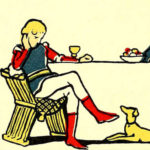We run our website the way we wished the whole internet worked: we provide high quality original content with no ads. We are funded solely by your direct support. Please consider supporting this project.

The Reformers and the Centrality of Christ
The Christocentric nature of the Church’s hermeneutic approached a zenith in the Protestant Reformation. While Luther and Calvin rejected allegorical interpretation, in theory if not in practice, they nevertheless relied on typology and other creative hermeneutical strategies to discern how Christ was the subject matter of the OT.
For Luther, Jesus was “the Word” in the most fundamental sense of the term, while the Bible was “the Word” in the derivative sense that it bore witness to him. In his famous preface to James, Luther went so far as to claim that the “proper touchstone for judging all books” is the extent to which they proclaim Christ. “Since all Scripture witnesses to Christ (Rom. 3:22ff),” and since “Paul is determined not to know anything save Christ (I Cor 2:2),” it followed for Luther that any book “that does not teach Christ is not yet apostolic, even though St. Peter or St. Paul does the teaching.”[1]
On this basis, Luther infamously concluded that the book of James was “an epistle of straw” in the original 1522 version of this preface. Reiterating the same point, a common refrain running throughout Luther’s writing is that, when properly interpreted—viz. with the eyes of faith and in light of Christ— one can discern not only that all Scripture is about Christ, but that it is about Christ alone. “The entire Old Testament refers to Christ,” he proclaims.[2] “Take Christ out of the Scriptures,” Luther rhetorically wonders, “and what else will you find in them?”[3] Similarly, it is for Luther “beyond question that all the Scriptures point to Christ alone.”[4] Like a letter a man first closed but then “afterwards broke it open,” so too, Luther says, “the Old Testament is an epistle of Christ, which after His death He opened and caused to be read through the Gospel and proclaimed everywhere.”[5]
Likening Scripture to the cloth the baby Jesus was wrapped in, Luther at one point states that “[t]he law and the prophets are not rightly preached or known save we see Christ wrapped up in them.”[6] Indeed, “when viewed aright,” he states, “all stories in Holy Scripture refer to Christ.”[7] His most powerful Christocentric statement, reflecting Paul’s profession to know nothing except Christ crucified, is found when Luther boldly proclaims: “I see nothing in Scripture except Christ Crucified.”[8]
Though he is certainly less rhetorical than Luther on the topic, Calvin also strongly affirmed a Christocentric hermeneutic. Commenting on John 5:39, for example, Calvin states: “We ought to read the Scriptures with the express design of finding Christ in them,” he asserts.[9] So too, the one thing “we should…seek in the whole of Scripture,” Calvin avers, is “truly to know Jesus Christ.”[10]
The Reformers clearly confessed that in Christ we find the foundational unity of both Testaments, for both are portraits of Christ, the only difference being in “the manner of painting.”[11]
[1] “Preface to James”, Luther’s Works, Vol. 35, Word and Sacrament, ed. E. T. Bachmann (Philadelphia: Muhlenberg Press, 1960), 396.
[2] WA 11.223.
[3] WA 18.606.
[4] WA 10.576.
[5] WA 10:11.181.
[6] Sermon on Luke 2:1-2, WA 10.11.80.
[7] WA, 4.153.
[8] WA 4.153.
[9] Calvin, Commentary on the Harmony of the Evangelists, tran. W. Pringle (Grand Rapids: Baker, 1979), 219 (see fn. 141)
[10] Preface to French translation of the NT, cited in Greidanus, Preaching Christ, 141.
[11] Calvin. Commentary on the Epistle of Paul the Apostle to The Hebrews , tran. J. Owen (Grand Rapids, MI: Baker, 1979), 222. See S. Edmondson, Calvin’s Christology (Cambridge: Cambridge University Press, 2004), 168–81 and E. J. Alexander, “The Supremacy of Jesus Christ,” in John Calvin: A Heart for Devotion, Doctrine, and Doxology (ed. Burk Parsons; Orlando: Reformation Trust, 2008), 109. Barth notes that, in contrast to the liberal theologies of Ritschl and Schleiermacher, Luther and Calvin didn’t have to try to be “Christocentric,” for their theologies were grounded in Christology from the outset, which, Barth rightly contends, is the only way a theology can be truly Christocentric. CD I/2:350–51
Photo via VisualHunt.com
Category: General
Tags: Christocentrism, Cruciform Theology, John Calvin, Martin Luther
Related Reading

The Cruciform Center Part 1: How Matthew, Mark and Luke Reveal a Cruciform God
In the previous series of posts I’ve argued that a merely “Christocentric” approach to God is too general, as can be shown by the widely different conceptions of God people arrive at, despite their claim to be “Christocentric.” The confession that Jesus reveals what God is like is simply too abstract, for it leaves too…

The Cruciform Beauty of Horrific Divine Portraits
“Only a person who is aware of the crucified Christ can properly understand Scripture.” Luther (Table Talks) In the last three posts I’ve been wrestling with how insights from Matthew Bate’s book, The Hermeneutics of the Apostolic Proclamation might help us interpret violent portraits of God in the OT in a way that discloses how…

Jesus and the “Eye for an Eye” Command: A Response to Paul Copan (#10)
As I noted in my 9th response to Paul Copan’s critique of Crucifixion of the Warrior God (CWG), Copan argues that Jesus merely repudiated wrong applications of OT laws in his sermon on the mount, not any OT law itself. He thus thinks I’m mistaken when I argue that Jesus placed his own authority above…

Podcast: Is Open Theism an Accommodation?
Or for that matter is accommodation an accommodation? Greg talks about things that impact God. http://traffic.libsyn.com/askgregboyd/Episode_0407.mp3

A Coming Storm
There is a storm beginning to brew on the horizon. It is a debate among Evangelicals about the violent depictions of God, stirred up largely by Eric Seibert’s Disturbing Divine Behavior. Here is a post that sounds “the clarion call.” The debate is presently around two options. Option #1: Traditionalists argue we must simply embrace…

Eye for Eye: That Time Jesus Refuted An Old Testament Teaching
One of the most surprising aspects of Jesus’ teaching is that, while he clearly shared his contemporaries’ view of the Old Testament as inspired by God, he was nevertheless not afraid of repudiating it when he felt led by his Father to do so (Jn. 8:28; 12:49-50; 14:31). For example, while the OT commands people…
